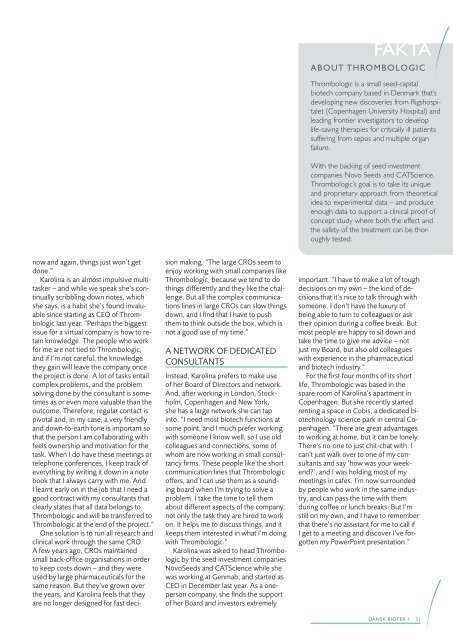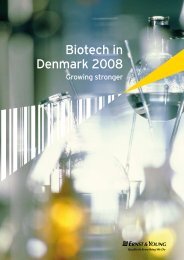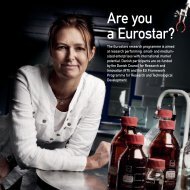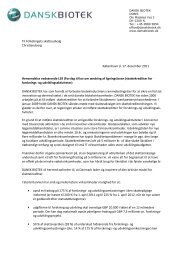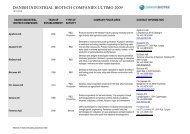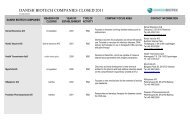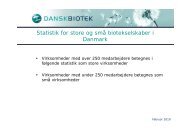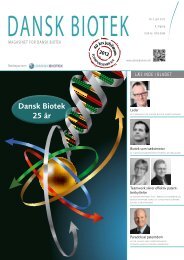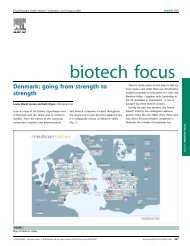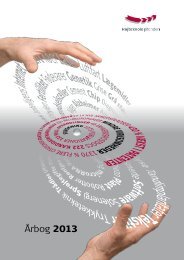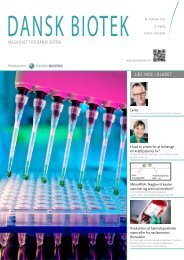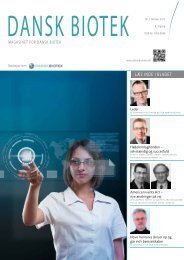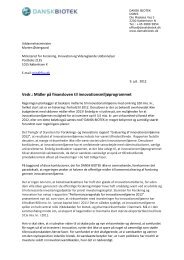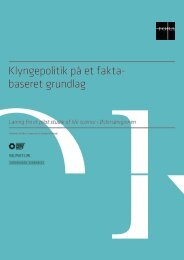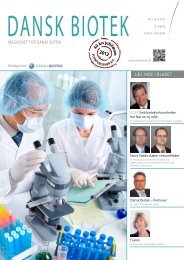Dansk Biotek Magasinet nr. 1 2010
Dansk Biotek Magasinet nr. 1 2010
Dansk Biotek Magasinet nr. 1 2010
You also want an ePaper? Increase the reach of your titles
YUMPU automatically turns print PDFs into web optimized ePapers that Google loves.
now and again, things just won’t get<br />
done.”<br />
Karolina is an almost impulsive multitasker<br />
– and while we speak she’s continually<br />
scribbling down notes, which<br />
she says, is a habit she’s found invaluable<br />
since starting as CEO of Thrombologic<br />
last year. “Perhaps the biggest<br />
issue for a virtual company is how to retain<br />
knowledge. The people who work<br />
for me are not tied to Thrombologic,<br />
and if I’m not careful, the knowledge<br />
they gain will leave the company once<br />
the project is done. A lot of tasks entail<br />
complex problems, and the problem<br />
solving done by the consultant is sometimes<br />
as or even more valuable than the<br />
outcome. Therefore, regular contact is<br />
pivotal and, in my case, a very friendly<br />
and down-to-earth tone is important so<br />
that the person I am collaborating with<br />
feels ownership and motivation for the<br />
task. When I do have these meetings or<br />
telephone conferences, I keep track of<br />
everything by writing it down in a note<br />
book that I always carry with me. And<br />
I learnt early on in the job that I need a<br />
good contract with my consultants that<br />
clearly states that all data belongs to<br />
Thrombologic and will be transferred to<br />
Thrombologic at the end of the project.”<br />
One solution is to run all research and<br />
clinical work through the same CRO.<br />
A few years ago, CROs maintained<br />
small back-office organisations in order<br />
to keep costs down – and they were<br />
used by large pharmaceuticals for the<br />
same reason. But they’ve grown over<br />
the years, and Karolina feels that they<br />
are no longer designed for fast deci-<br />
sion making. “The large CROs seem to<br />
enjoy working with small companies like<br />
Thrombologic, because we tend to do<br />
things differently and they like the challenge.<br />
But all the complex communications<br />
lines in large CROs can slow things<br />
down, and I find that I have to push<br />
them to think outside the box, which is<br />
not a good use of my time.”<br />
A NETWORK OF DEDICATED<br />
CONSULTANTS<br />
Instead, Karolina prefers to make use<br />
of her Board of Directors and network.<br />
And, after working in London, Stockholm,<br />
Copenhagen and New York,<br />
she has a large network she can tap<br />
into. “I need most biotech functions at<br />
some point, and I much prefer working<br />
with someone I know well, so I use old<br />
colleagues and connections, some of<br />
whom are now working in small consultancy<br />
firms. These people like the short<br />
communication lines that Thrombologic<br />
offers, and I can use them as a sounding<br />
board when I’m trying to solve a<br />
problem. I take the time to tell them<br />
about different aspects of the company,<br />
not only the task they are hired to work<br />
on. It helps me to discuss things, and it<br />
keeps them interested in what I’m doing<br />
with Thrombologic.”<br />
Karolina was asked to head Thrombologic<br />
by the seed investment companies<br />
NovoSeeds and CATScience while she<br />
was working at Genmab, and started as<br />
CEO in December last year. As a oneperson<br />
company, she finds the support<br />
of her Board and investors extremely<br />
ABout thromBoLogiC<br />
Thrombologic is a small seed-capital<br />
biotech company based in Denmark that’s<br />
developing new discoveries from Rigshospitalet<br />
(Copenhagen University Hospital) and<br />
leading frontier investigators to develop<br />
life-saving therapies for critically ill patients<br />
suffering from sepsis and multiple organ<br />
failure.<br />
With the backing of seed investment<br />
companies Novo Seeds and CATScience,<br />
Thrombologic’s goal is to take its unique<br />
and proprietary approach from theoretical<br />
idea to experimental data – and produce<br />
enough data to support a clinical proof of<br />
concept study where both the effect and<br />
the safety of the treatment can be thoroughly<br />
tested.<br />
important. “I have to make a lot of tough<br />
decisions on my own – the kind of decisions<br />
that it’s nice to talk through with<br />
someone. I don’t have the luxury of<br />
being able to turn to colleagues or ask<br />
their opinion during a coffee break. But<br />
most people are happy to sit down and<br />
take the time to give me advice – not<br />
just my Board, but also old colleagues<br />
with experience in the pharmaceutical<br />
and biotech industry.”<br />
For the first four months of its short<br />
life, Thrombologic was based in the<br />
spare room of Karolina’s apartment in<br />
Copenhagen. But she recently started<br />
renting a space in Cobis, a dedicated biotechnology<br />
science park in central Copenhagen.<br />
“There are great advantages<br />
to working at home, but it can be lonely.<br />
There’s no-one to just chit-chat with: I<br />
can’t just walk over to one of my consultants<br />
and say ‘how was your weekend?’,<br />
and I was holding most of my<br />
meetings in cafes. I’m now surrounded<br />
by people who work in the same industry,<br />
and can pass the time with them<br />
during coffee or lunch breaks. But I’m<br />
still on my own, and I have to remember<br />
that there’s no assistant for me to call if<br />
I get to a meeting and discover I’ve forgotten<br />
my PowerPoint presentation.”<br />
dAnsk <strong>Biotek</strong> 1 31


